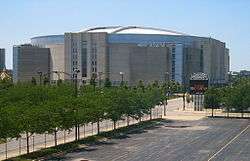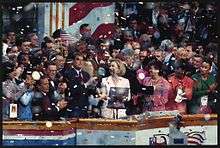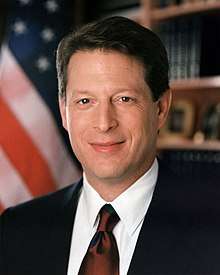1996 Democratic National Convention
The 1996 National Convention of the U.S. Democratic Party was held at the United Center in Chicago, Illinois, from August 26 to August 29, 1996. President Bill Clinton and Vice President Al Gore were nominated for reelection. This was the first national convention of either party to be held in Chicago since the disastrous riots of the 1968 Democratic convention, and as of 2016, the most recent presidential convention held in the city by either major party.
1996 presidential election.png) | |
  Nominees Clinton and Gore | |
| Convention | |
|---|---|
| Date(s) | August 26–29, 1996 |
| City | Chicago, Illinois |
| Venue | United Center |
| Keynote speaker | Evan Bayh |
| Notable speakers | Christopher Dodd Mario Cuomo Hillary Clinton Christopher Reeve Ted Kennedy |
| Candidates | |
| Presidential nominee | Bill Clinton of Arkansas |
| Vice presidential nominee | Al Gore of Tennessee |
| Voting | |
| Total delegates | 4,289 |
| Votes needed for nomination | 2,147 |
| Results (President) | Clinton (AR): 4,277 (99.72%) Abstaining: 12 (0.28%) |
| Results (Vice President) | Gore (TN): 4,289 (100%) |
| Ballots | 1 |
Site selection

Chicago, Los Angeles, New Orleans, New York, and San Antonio were originally considered as possible host cities. On August 4, 1994, it was announced that Chicago had beaten out the other finalist, San Antonio, for the right to host the convention.[1] This would mark the first time that Chicago hosted a major presidential year political convention since the violent 1968 Democratic National Convention, and the first time a political convention was held in the United Center, which had been built earlier that decade.[2]
This was the 25th major party convention to be held in Chicago.[2] Chicago has held more major party conventions than any other city.[2][3][4] As of 2020, this is the last major party convention to be held in Chicago.[3]
Notable speakers
The convention's keynote speaker was Governor Evan Bayh of Indiana. The nomination speech was given by Senator Christopher Dodd of Connecticut. Other notable speakers included former New York governor Mario Cuomo, First Lady of the United States Hillary Rodham Clinton, actor Christopher Reeve, House Minority Leader Dick Gephardt, Senate Minority Leader Tom Daschle, and other Senators Russ Feingold of Wisconsin, and John Kerry and Ted Kennedy of Massachusetts.
Clinton's renomination speech
.jpg)

Clinton's speech on August 29 included his vision for the next decade, included tax cuts for the middle-class, 20 million more jobs, a strong defense with cuts in the military, but a strong presence of peacemaking troops, new military weapons and tanks, welfare reform goals for states and communities, and a peaceful transition for the Middle East.
Lyndon LaRouche
Lyndon LaRouche had run for president through multiple parties over multiple election cycles. In 1996, he ran for the nomination of the Democratic party, despite the Chair of the Democratic National Party ruling that Lyndon LaRouche "is not to be considered a qualified candidate for nomination of the Democratic Party for President" before the primaries began. In subsequent primaries LaRouche received enough votes in Louisiana and Virginia to get one delegate from each state. When the state parties refused to award the delegates, LaRouche sued in federal court, claiming a violation of the Voting Rights Act. After losing in the district court, the case was appealed to the First District Court of Appeals, which sustained the lower court.[5]
Voting
Clinton was nominated unanimously for a second term and Vice President Al Gore by voice vote.
The Balloting:
| Candidates |  |
|---|---|
| Name | William J. Clinton |
| Certified Votes | 4,277((99.72%) |
| Abstentions | 12 (0.28%) |
| total: | 4,337 |
Clinton and Gore went on to defeat Bob Dole and Jack Kemp in the November general election in an Electoral College landslide with a substantial popular vote margin.
Notable events
In the middle of the convention, many of the delegates danced to the song Macarena. Al Gore famously danced to the song while standing still.[6][7]
The original Broadway cast of Rent performed "Seasons of Love" at the end of the Convention.[8][9]
Taste of Chicago, a group of restaurants who have an annual street festival, catered the press area.
See also
- 1996 Republican National Convention
- Bill Clinton presidential campaign, 1996
- Democratic Party presidential primaries, 1996
- 1996 United States presidential election
- History of the United States Democratic Party
- List of Democratic National Conventions
- U.S. presidential nomination convention
References
- "Chicago Convention". CNN All Politics. Retrieved September 4, 2012.
- "AllPolitics - Democratic National Convention". www.cnn.com. CNN. 1996. Retrieved 6 August 2020.
- "Why the Conventions No Longer Come To Chicago". NBC Chicago. WMAQ-TV. 5 September 2012. Retrieved 6 August 2020.
- Sautter, R. Craig. "Political Conventions". www.encyclopedia.chicagohistory.org. Encyclopedia of Chicago. Retrieved 6 August 2020.
- "USA v. Khan Mohammed". U.S. Court of Appeals for the D.C. Circuit. Retrieved September 4, 2012.
- Lawrence, Derek (July 29, 1996). "Relive Hillary Clinton dancing to the 'Macarena' at the 1996 DNC". Retrieved July 31, 2016.
- Plante, Chris (July 29, 2016). "When the Macarena moved Hillary Clinton and the 1996 Democratic National Convention to dance". The Verge. Retrieved July 31, 2016.
- Metz, Nina (February 8, 2008). "Seasons of 'Rent': From 'La Boheme' to becoming an icon". Retrieved August 1, 2016.
- Román, David (February 1, 1998). Acts of Intervention: Performance, Gay Culture, and AIDS. Indiana University Press. p. 282. ISBN 978-0-253-21168-2. Retrieved August 1, 2016.
External links
- President Clinton Speaking at the Convention on YouTube
- Democratic Party Platform of 1996 at The American Presidency Project
- Clinton Nomination Acceptance Speech for President at DNC (transcript) at The American Presidency Project
- Video of Clinton nomination acceptance speech for President at DNC (via YouTube)
- Audio of Clinton nomination acceptance speech for President at DNC
- Video of Gore nomination acceptance speech for Vice President at DNC (via YouTube)
- Audio of Gore nomination acceptance speech for Vice President at DNC
- Transcript of Gore nomination acceptance speech for Vice President at DNC
- Video of Evan Bayh's Keynote Address at Democratic National Convention
| Preceded by 1992 New York, New York |
Democratic National Conventions | Succeeded by 2000 Los Angeles, California |


